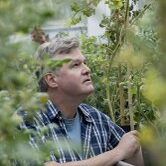Our Management Board is made up of scientific and agricultural experts with a wide range of expertise relating to vector-borne disease.
Management Board terms of reference
- To advise and monitor the Executive Group and safeguard the interests of the Network
- To shape Network strategy and advise on Network scope
- To receive reports on progress towards the Network’s aims and objectives
- Be a spokesperson for the CONNECTED Network

Dr Lava Kumar (Chair)
International Institute of Tropical Agriculture (IITA), Nigeria
Dr Lava Kumar is the Head of the Germplasm Health, Virology and Molecular Diagnostics Units at the International Institute of Tropical Agriculture (IITA), Ibadan, Nigeria. He joined IITA in 2007 and his research work is focused on characterization, diagnosis, surveillance and control of plant viruses affecting important food staple crops such as cassava, yam, maize, soybean, cowpea, banana, in sub-Saharan Africa. He is also involved in the production of disease-free planting materials, seed health testing, surveillance of invasive transboundary pathogens, and development of diagnostic tools. Dissemination of knowledge and technology, and capacity development of national program partners through training courses and workshops in plant disease diagnostics and control, are among the key objectives of his program. His research also pioneering ICT-based tools for surveillance and seed quality assurance.
Prior to joining IITA, he worked from 1999 as a Scientist (Virologist) at the International Crops Research Institute for the Semi-Arid Tropics, Patancerhu, India. There his work mainly focused on viruses diseases of legume crops such as pigeonpea, groundnut and chickpea.
Some of the on-going research projects of Dr Kumar are on epidemiology and management of banana bunchy top disease, viruses of yam and cassava, maize streak and maize lethal necrosis; development of novel virus indexing methods for phytosanitation and virus indexing of vegetatively propagated crops. Controlling insect vector transmitted viruses are among his program priorities.
More about Dr. Lava Kumar

Dr. Titus Alicai
National Crops Resources Research Institute, Uganda
Dr Titus Alicai is a Principal Plant Virologist and Leader of the Root Crops Research Programme at the National Agricultural Research Organisation (NARO), Uganda. His main research goal is to understand and control plant viruses in sub-Saharan Africa, and he has extensive research experience on viral pathogens of cassava, sweet potato and yam. This includes virus taxonomy, molecular characterization, diagnosis, field epidemiology, effects on growth and yield, as well as tissue culture, genetic transformation and confined field evaluation of transgenic plants. He provided the first indication that Cassava brown streak disease is caused by two distinct viruses. The team that he leads, made up of over 100 researchers, has in recent years significantly contributed knowledge on cassava brown streak disease virology, whitefly vector, resistance breeding, transgenic control and clean seed systems. Dr. Alicai is a reviewer for leading plant pathology journals, has authored over 60 scientific publications, collaborates widely, within Africa and internationally.
More about Dr. Titus Alicai

Professor Toby Bruce
Keele University, UK
Professor Toby Bruce is Professor of Insect Chemical Ecology at Keele University, where his new group is conducting cutting-edge research on insect-host interactions, and testing hypotheses to better understand how to sustainably manage pest species, conserve beneficial species and thus improve food security. His expertise in insect-plant interactions is relevant to understanding the biology, ecology and chemical ecology of insect vectors of plant disease.
Prof Bruce’s research seeks to understand the complex interactions between organisms, particularly herbivorous insects and their host plants, in order to devise novel interventions for reducing crop losses to pests. His wide-ranging experience bridges academic and applied research and ranges from basic lab research to field evaluation and knowledge exchange. He has a strong research track record with over 100 scientific publications, studying agriculturally important insects, and their interactions with their host plants and their natural enemies.
More about Professor Toby Bruce

Professor John P. Carr
University of Cambridge, UK
Professor John P. Carr’s research interests at the University of Cambridge’s Department of Plant Sciences include plant-virus-insect interactions, and natural and engineered resistance to plant viruses.
He has worked in plant virology, defensive signalling, low molecular weight metabolite analysis and gene expression (plant and viral) for around 30 years. He has also collaborated with scientists in Ghana, Kenya, Rwanda, Uganda and Zimbabwe on aphid-transmitted virus problems.
More recently his research interests have expanded to include the effects of virus infection and plant interactions with beneficial insects.
More about Professor John P. Carr

Professor Richard Hopkins
University of Greenwich, Natural Resources Institute (NRI), UK
Professor Richard Hopkins has led a series of research and capacity development projects, focusing on applied and strategic research to control pests and vectors of disease in crops and humans. This work has been increasingly linked with Sub-Saharan Africa.
Key priority areas have been insect behaviour and the movement patterns of vectors. He has extensive experience of involvement in cross-disciplinary research, and leading and developing collaborative projects.
He maintains a broad interest in insect behaviour, including the different scales at which insects make decisions whilst finding their egg laying site. In addition to his work on insect plant relationships, he maintains work on habitat selection and egg laying site selection on mosquitoes. This is linked to The Ethiopian Institute for Water Resource Management, the International Centre of Insect Physiology and Ecology (ICIPE) and CGIAR.
More about Professor Richard Hopkins

Dr Christophe Lacomme
SASA, The Scottish Government, Edinburgh, UK
Dr Christophe Lacomme’s research interest lies in the field of virus population dynamics, diagnosis of virus species, disease aetiology, epidemiology, control and management of viruses in their environment, molecular mechanisms of resistance and susceptibility in plant-pathogen interactions.
He manages service delivery for diagnostic laboratories, surveillance work regarding pests of plant health significance and provides information and advice to stakeholders and to the Scottish’s government policy makers. He liaises with European Plant Protection Organisation and other European bodies in relation to the diagnostic and surveillance of regulated plant viruses.
More about Dr Christophe Lacomme

Dr James Legg
International Institute of Tropical Agriculture
James Legg is a Principal Scientist at the International Institute of Tropical Agriculture, with 25 years’ experience of working on plant viruses and their insect vectors.
Most of James’ professional career has focused on strengthening understanding of cassava viruses, and using that improved understanding to develop and facilitate the promotion of control strategies.
In addition to playing a direct active role in research, James has also contributed to strengthening African science capacity through producing training materials, leading training workshops and supervising post-graduate students.
James has been based at the IITA East Africa hub in Dar es Salaam, Tanzania, for the last twelve years, and he has been involved in running several regional R4D projects focused on cassava viruses, their whitefly vectors and the development and implementation of sustainable seed systems. Recently, James has played an increasing role in managing research on roots, tubers and bananas. He is currently IITA’s Focal Point for the Roots, Tubers and Bananas (RTB) CGIAR Research Programme (CRP), as well as the leader for RTB’s Flagship Project 3 on Resilient Cropping Systems.
More about Dr. James Legg

Dr Isaac Macharia
Kenya Plant Health Inspectorate Service
Dr. Isaac Macharia is General Manager Phytosanitary Services of KEPHIS, a government organisation whose responsibility is to assure the quality of agricultural inputs and produce to prevent adverse impact on the economy, the environment and human health.
His duties include coordinating activities on Phytosanitary Services all aimed and ensuring safe movement of plant and plant products thereby ensuring food security, safe trade and protecting Kenya’s agriculture.
He has over 16 years’ experience in Phytosanitary regulation in Africa. As an expert in phytosanitary regulation with a lot of interest in Vector virus integration in phytosanitary system.
He has also been involved identification of quarantine pest, development of diagnostic protocol for quarantine pests, undertaking Pest risk analysis, production and distribution of disease-free germplasm, seed health testing, surveillance of quarantine pest and diseases and accreditation of plant health laboratories.

Dr Jacob Mignouna
Dr Jacob Mignouna is International Senior Consultant at The Center for Sustainable Agriculture, Food and Environment for Africa (C-SAFE-Africa). He has over 25 years’ experience in agriculture, food and nutrition development. He is a development professional with extensive experience in building partnerships that facilitate access to advanced and innovative technologies: from private and public sectors to drive technologies, to products and service adoption for economic and social impact.
C-SAFE- Africa is a not-for-profit company being registered in Kenya in 2020. C-SAFE-Africa deals with issues of resilient and sustainable agriculture, food and nutrition and environment in eastern, southern, central and western Africa.

Dr Emmanuel Okogbenin
African Agricultural Technology Foundation (AATF), Kenya
Dr Emmanuel Okogbenin is Director of Technical Operations at AATF, and has worked for over 27 years in research and development related to both biotic and abiotic stresses through crop improvement, agronomic and physiological studies.
He has led a number of project initiatives using several molecular platforms to understand and improve genetic resistance to pests and diseases including the African cassava mosaic virus.
In his AATF role, he identifies opportunities for agricultural technology interventions, assesses the feasibility and probability of project concept success, identifies sources of appropriate technologies, negotiates their access and deployment, and provides overall leadership in the implementation of AATF’s project portfolio.
More about Professor Emmanuel Okogbenin

Dr Yvonne Pinto
Agricultural Learning and Impacts Network (ALINe), UK
Yvonne Pinto is the Director of ALINe, an initiative dedicated to the improvement of measurement, learning and evaluation in development with a particular emphasis on the agricultural sector.
She has a longstanding interest in agricultural development, particularly in Sub-Saharan Africa where she has spent 20 years supporting the creation and performance of effective institutions and agricultural research and development programmes.
She was also recently a Research Fellow and Deputy Investigator for the Africa and Europe: Partnerships in Food and Farming based at the Centre for Environmental Policy at Imperial College. Previously she was Africa Executive at the Gatsby Foundation and Programme Officer at the Bill and Melinda Gates Foundation.
She has a BSc in Plant Sciences and Agriculture, MSc in Biotechnology and PhD in Virology from Reading and Imperial College.
More about Dr. Yvonne Pinto

Professor Susan Seal
University of Greenwich, Natural Resources Institute (NRI), UK
Professor Susan Seal is the Leader of the Molecular Virology and Entomology Research Group at NRI, which focuses on applied as well as strategic research for controlling pests and diseases of tropical food crops especially those caused by viruses and insect vectors on cassava, sweet potato, yams and vegetables. Key priority areas have been insect vector characterisation and the development of molecular diagnostic tests suitable for effective technology transfer to NARS laboratories in East and West Africa working on cassava and yam viruses.
More about Professor Susan Seal

Dr Julian Smith
Rothamsted Research
Dr Julian Smith is Science Director for Protecting Crops and Environment at Rothamsted Research. Building on a career in plant health and external affairs, Julian provides leadership on science strategy, alongside engagement with UK and overseas governments, academia, foundations and industry. Julian’s career has focused on plant pest risk assessment, biosecurity, and capacity strengthening. He has worked on crops as varied as potato, banana, coconut and cassava, in East Africa, South America and Asia.
In recent years he has provided expert advice on research and policy development for most of the recent major emerging pest outbreaks of East Africa, including Banana Xanthomonas wilt, Cassava brown streak disease and Maize lethal necrotic disease.
More about Dr. Julian Smith

Professor Lesley Torrance
The James Hutton Institute, UK
Professor Lesley Torrance is Director of Science at The James Hutton Institute and Professor of Biology at the University of St Andrews.
Her research interests include studies of plant virus-host interactions and virus-vector interactions. They also include investigating the molecular mechanisms of host resistance and susceptibility and virus transmission with a focus on potato viruses particularly Potato virus Y and Potato mop-top virus.
A recent focus of her research is to study the effects of abiotic stress on virus resistance. She also works to use her knowledge and experience to strengthen potato production systems in developing countries, particularly in Sub-Saharan Africa.
More about Professor Lesley Torrance

Professor John Walsh
University of Warwick, UK
Professor John Walsh is currently group leader for the Plant Virus Interactions Group in the School of Life Sciences at the University of Warwick. He has authored over 50 papers in peer reviewed journals, a number of book chapters, many articles in the popular press and many information leaflets and technical reports for growers.
The thrust of his research programme is to control plant viruses, primarily through exploiting fundamental research on natural plant resistance to develop virus-resistant crops. Commercial release of plant varieties possessing broad-spectrum, potentially durable virus resistance emanating from his research is anticipated within the next two years.
He has been involved in funded international collaborations with many countries including, Spain, The Netherlands, Sweden, Czech Republic, Poland, Germany, Canada, Brazil, Japan and China. Much of his research has been focussed on brassica viruses infecting arable and vegetable crops in Europe. One of the novel forms of resistance he identified has been patented and the patent is being pursued worldwide by one of the major plant breeding / seed companies. He has commercialised a number of other products including diagnostic reagents.
He has served as President of the International Working Group for Legume and Vegetable Viruses, with members in 28 countries and has served on BBSRC and NERC committees. He was an elected Member of the Virology Division Committee of Society for General Microbiology (SGM) and a member of Virology Group Committee of the Association of Applied Biologists (AAB). He has also been an editor for a range of journals including, the Annals of Applied Biology, European Journal of Plant Pathology, Journal of General Plant Pathology, Associate Editor-in-chief Horticultural Plant Journal and Editorial Board of Plant Biotechnology.
More about Professor John Walsh

Dr. Cathrine Ziyomo
Biosciences eastern and central Africa (B4A) – ILRI Hub
Cathrine is currently leading the B4A-ILRI Hub, a shared agricultural research and biosciences platform that provides and increases access to world class laboratories for African and international scientists conducting research on African agricultural challenges.
B4A’s mission is to mobilize biosciences for Africa’s development by providing a centre for excellence in agricultural biosciences. Cathrine’s role is to ensure that B4A enables research and empowers African scientists and institutions to harness innovations for regional impacts in improved agricultural productivity, income and food and nutritional security.
Cathrine is a trained molecular breeder and geneticist who is driven by her goal to increase genetic gains in breeding programs, promote environmental stewardship and foster greater economic growth for the agricultural community through the development and availability of good quality seeds. She brings to B4A combined experience from both private and public sector breeding and her expertise in plant genetics and biotechnology for improved nutritional value and yield improvement. Before her current role as B4A-ILRI Hub’s program lead, she was a technical lead breeder for the Integrated Genotyping Service and Support (IGSS) a service platform enabling crop and livestock scientists to improve the efficiency and effectiveness of their breeding programs using molecular tools. She still continues work on developing a diversity panel for maize and beans in East Africa using germplasm from five east African countries.

